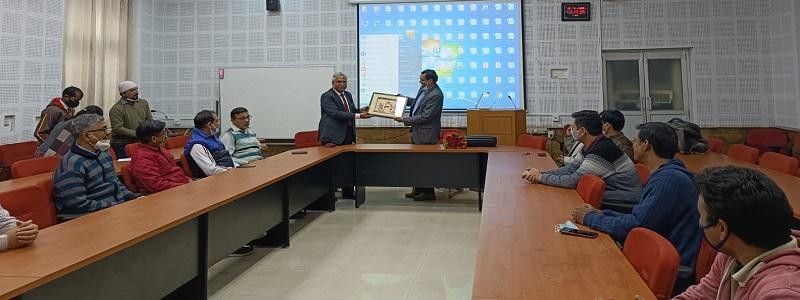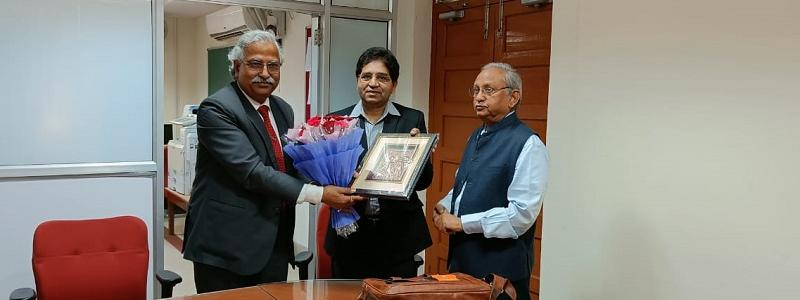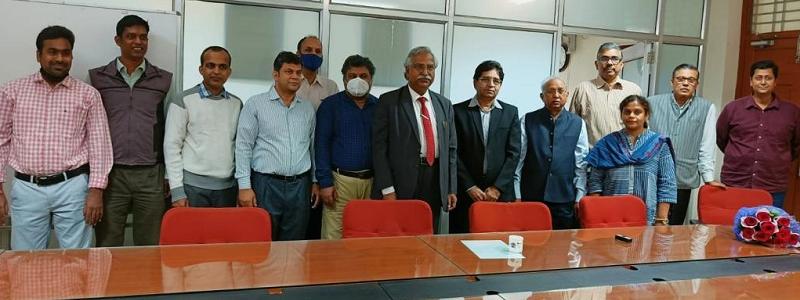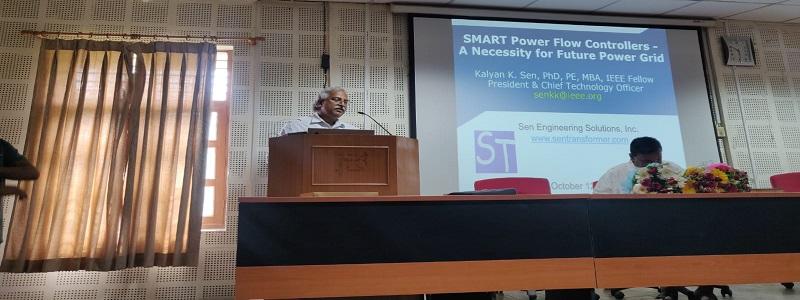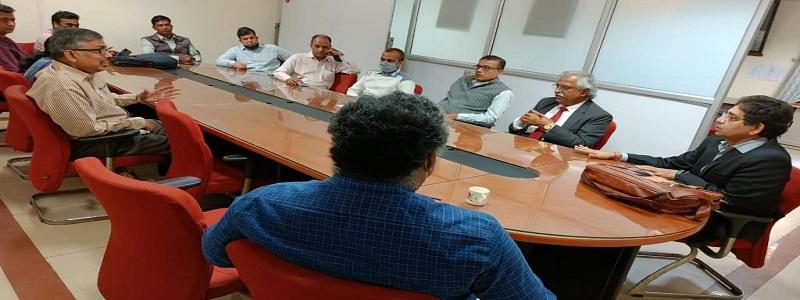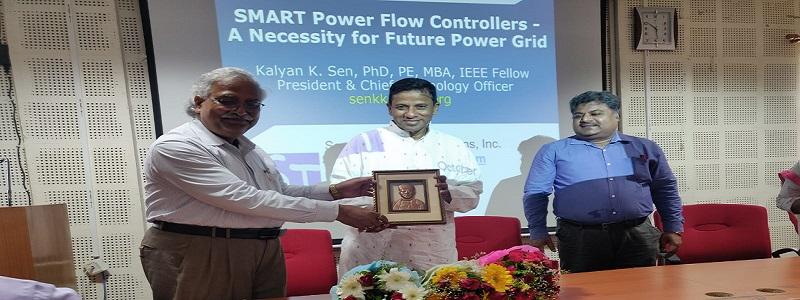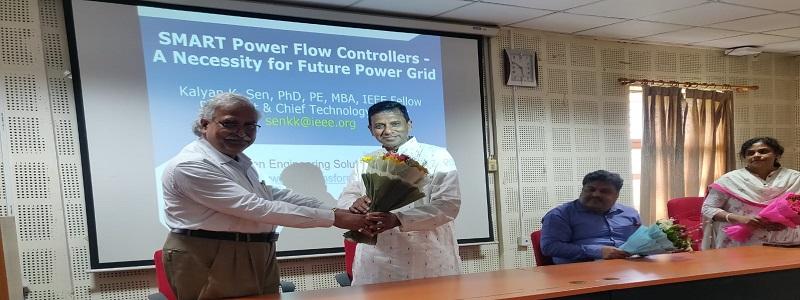Programs
-
B.TechThe department offers four year Bachelor of Technology (B. Tech) program (comprising of eight semesters) in Electrical Engineering. It is one of the oldest undergraduate engineering programs in the country for advanced study in the field of Electrical Sciences and recognized world over for its academic excellence. Show(+) The curriculum of B. Tech program comprises of core courses, department elective courses, institute electives, seminar, laboratory experiments and projects. The program offers sufficient flexibility so that the students can undertake various elective courses that provide exposure in various specializations in electrical engineering, such as Power Electronics, Electrical Machines and drives, Power System, Control System and systems engineering. The undergraduate students can also undertake various research projects through exploratory, undergraduate and stream projects that are embedded in the curriculum. The primary goal of the exploratory project is to facilitate a window to the students for experimentation, model development and learning advanced tools. Undergraduate projects expose the students to applying research methodologies in processes or product development/ innovation/ design. Hide(-)
-
M.TechDepartment of Electrical Engineering runs five postgraduate (M. Tech.) programmes in Electrical Machines and Drives (since 1956), Power Systems (since 1964), Control Systems (since 1964), Power Electronics (since 1982) and Interdisciplinary Systems Engineering (since 1982). It is a full time program of two years duration with limited Teaching Assistant (TA) positions available in the department. Show(+) TA positions require valid GATE score in EC/EE/IN/PH/CS disciplines as prescribed for various specializations. The department attaches lot of importance to its Master's students providing them ample opportunities towards research and development.
M.Tech program comprises of core courses, specialization related electives, institute electives and supervised research exposition. M.Tech thesis enables graduate students to display their skills in performing independent research in both classical and modern problems of electrical sciences and related areas. It is expected that M. Tech thesis would result in high quality research publications or patent or prototype technology development. Hide(-) -
Ph.D.Doctor of Philosophy (PhD) program is a flagship program of the department's research. Ph. D. programme are available in all disciplines of Electrical Engineering. Our researchers are making a real difference, developing innovative technologies and shaping our society. Show(+) Applied research is a particular strength of our research community, who are working with government, industry and partner organizations to tackle a wide range of exciting and diverse issues critical to improving lives and creating a more equal society in our region and beyond. Our research informs teaching and learning to enrich our students’ experience.
Requirement for successful completion of PhD
PhD program comprises of course work for prescribed credits with a minimum prescribed performance and a research dissertation reflecting original and independently performed research contributions in the respective area.
In Electrical Engineering department, all admitted students are required to successfully complete PhD qualifier examination after completing the prescribed course work. PhD candidacy is confirmed only after the student has been declared successful in qualifier examination. PhD thesis is expected to result in high quality publications in peer reviewed international journals and conferences with a minimum of one journal and one conference paper publication before the thesis can be submitted for review.
Funding support for PhD
Limited Teaching Assistant (TA) positions are available in the department. All teaching assistants are required to assist course instructors in grading, conducting tutorial and examinations etc., for the prescribed hours per week. PhD scholars getting support as TA may also beassigned any academic or administrative duties related to various activities of the department such as admissions, examinations duty etc., by the Head of the department.
If you are interested in enquiring a position available with a faculty member in his/her sponsored research grants for PhD, you may contact the faculty member/s relevant to your research areas. Hide(-)
Specializations:
-
Electrical Machines and DrivesElectrical machines are integral part of Electrical Engineering. The growth of any country is greatly dependent on electrical machines. Click for details...
-
Power SystemsAmong the different specialization in electrical engineering, Power system is one of the leading specialization. Click for details...
-
Control Systems EngineeringA broad activity of Control system group involves analysis of dynamical systems and feedback controller design for improving system performance. Click for details...
-
Power ElectronicsAs a distinct technology and as an academic discipline power electronics has grown tremendously over the last two decades. Click for details
-
Systems Engineering (Inter-disciplinary)The Systems Engineering is a unique interdisciplinary program that offers post graduate education in the broad area of systems design and control engineering. Click for details
Historical Background
Mahamana Pt. Madan Mohan Malviya founded BHU in the year 1916, with benevolent and magnanimous contributions of the then maharajas and other persons of eminence. The University was nurtured by Sir Sunderlal, as the 1 st V.C. of the university, followed by the great visionaries, such as Pt. Madan Mohan Malviya, Acharya Narendradev, Sir S. Radhakrishnan and many other eminent personalities. Show(+)
The Benaras Engineering College (BENCO) was started in the year 1919, with its strong foundation laid by revered Prof. Charles A. King, Prof. H. P. Philpot and Prof. M. Sengupta. With the passage of time, College of Mining and Metallurgy (MINMET) and College of Technology (TECHNO) were included, expanding its horizon. These three colleges were merged and named as Institute of Technology in the year 1968 with a view to give more autonomy for its better perspective in terms of academic as well as administrative decisions. Its undergraduate students are admitted through Joint Entrance Examination (JEE) being conducted for all IITs. Since the inception of BENCO in 1919, combined Bachelor’s degree in Mechanical and Electrical Engineering was awarded till 1952. Department of Mechanical Engineering and Department of Electrical Engineering were separated in 1953 and conferred separate degrees in respective disciplines.
Presently, Department of Electrical Engineering runs five post graduate (M. Tech.) programmes in Electrical Machines and Drives (started in 1956), Power Systems (started in 1964), Control Systems (started in 1964), Power Electronics (started in 1982) and Interdisciplinary Systems Engineering (started in, 1982) and Ph. D. programme in all disciplines of Electrical Engineering. The department has also a five year Integrated Dual Degree Program (started in 2006) leading to Masters degree with specialization in Power Electronics. The department has been sanctioned Special Assistance Programme (SAP) of UGC since 1988 and COSIST program of UGC from 1995 to 2000. Apart from these, the department has been conducting research projects funded by DST, AICTE, CPRI and other R&D organizations of Govt. of India.
Department has very good placement records over the years. The students of this department are joining core companies such as PGCIL, IOCL, HPCL, Trident, Reliance, Maruti, etc. Electronics companies such as Broadcom, Sony, etc are also regularly recruiting students of this department. Our students are also regularly joining software companies such as Morgan Stanley, Goldman Sachs, Citrix, Oracle, SISO, etc. The vast number of job offers is mainly due to the versatility of the branch which ensures that students are allowed to sit for interviews in software, core electrical, electronic as well as non-technical companies.
Hide(-)
The Benaras Engineering College (BENCO) was started in the year 1919, with its strong foundation laid by revered Prof. Charles A. King, Prof. H. P. Philpot and Prof. M. Sengupta. With the passage of time, College of Mining and Metallurgy (MINMET) and College of Technology (TECHNO) were included, expanding its horizon. These three colleges were merged and named as Institute of Technology in the year 1968 with a view to give more autonomy for its better perspective in terms of academic as well as administrative decisions. Its undergraduate students are admitted through Joint Entrance Examination (JEE) being conducted for all IITs. Since the inception of BENCO in 1919, combined Bachelor’s degree in Mechanical and Electrical Engineering was awarded till 1952. Department of Mechanical Engineering and Department of Electrical Engineering were separated in 1953 and conferred separate degrees in respective disciplines.
Presently, Department of Electrical Engineering runs five post graduate (M. Tech.) programmes in Electrical Machines and Drives (started in 1956), Power Systems (started in 1964), Control Systems (started in 1964), Power Electronics (started in 1982) and Interdisciplinary Systems Engineering (started in, 1982) and Ph. D. programme in all disciplines of Electrical Engineering. The department has also a five year Integrated Dual Degree Program (started in 2006) leading to Masters degree with specialization in Power Electronics. The department has been sanctioned Special Assistance Programme (SAP) of UGC since 1988 and COSIST program of UGC from 1995 to 2000. Apart from these, the department has been conducting research projects funded by DST, AICTE, CPRI and other R&D organizations of Govt. of India.
Department has very good placement records over the years. The students of this department are joining core companies such as PGCIL, IOCL, HPCL, Trident, Reliance, Maruti, etc. Electronics companies such as Broadcom, Sony, etc are also regularly recruiting students of this department. Our students are also regularly joining software companies such as Morgan Stanley, Goldman Sachs, Citrix, Oracle, SISO, etc. The vast number of job offers is mainly due to the versatility of the branch which ensures that students are allowed to sit for interviews in software, core electrical, electronic as well as non-technical companies.
Hide(-)


